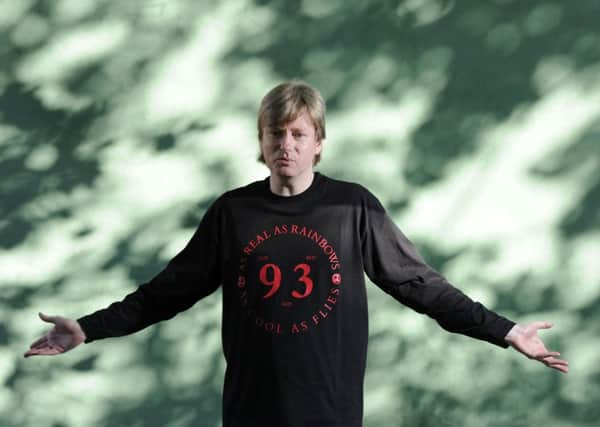Book review: The Book of Strange New Things


THE BOOK OF STRANGE NEW THINGS
by MICHEL FABER
Canongate, 592pp,£18.99
Watch your step. Keep your wits about you,” warned the narrator in Michel Faber’s last novel, The Crimson Petal and the White, dragging countless readers into the grimy world of underclass Victorian London. You might think you know where you are going, he added, but you don’t. “The truth is that you are an alien from a different time and place altogether.”
You are that, but even more so, in Faber’s latest novel, which haunts the imagination long after last page. In it, Peter, a Christian minister, is on a mission to evangelise the aboriginal inhabitants of the planet Oasis, a featureless, flat land with no moon above it and hardly any plants apart from occasional bursts of white mushrooms. The atmosphere is so damp that walking feels almost like swimming.
Advertisement
Hide AdThe first Oasan he meets is a cowled figure whose face Faber describes with studied ambiguity as first, looking like a whitish-pink walnut kernel, then “like a placenta with two foetuses”. But the point about the Oasans isn’t what they look like, but what they want from Peter. And what they want is to be saved, to hear the Gospel stories from what they call The Book of Strange New Things.
That meeting happens more than 100 pages into the novel, and in that time Faber has engaged the reader’s attention at a deeper level. Yes, we are in a strange new world where the atmosphere creeps beneath our clothing like water, where we can’t properly describe what an alien’s face looks like because we have nothing to compare it to. But look at how he took us there, how he seeded our emotional engagement.
First of all, there’s a love story. Peter and his wife Bea, are in a long, loving marriage. We are introduced to them while they are driving to Heathrow. She asks him to pull into a layby and they make love – somewhat reluctantly on his part because he feels their last night together was sexually perfect, rather desperately on hers, as awareness of his imminent absence grows. At this stage, sex between loving, married Christians is surprise enough in fiction, and there isn’t any hint of interplanetary evangelising. For all we know, Peter could be flying abroad to visit a sick relative, or go to a Christian conference. Even when we first hear of USIC – Oasis’s colonisers – there is no explanation of what they do.
All this time, we are solidly in our own, dull part of the planet. The anomie of the airport descends. The Tannoy regrets late arrivals. Strangers complain about the price of the food. Peter visits the airport chapel, examines other people’s prayer messages. All this old-world detail matters, because it shores up the reader’s belief in the new: when we get there we don’t just see foetus-faced aliens but realise the immensity of Peter’s mission to his new flock. How is he going to learn their impenetrable language? How can he preach the parable of the Good Shepherd to a flock who have never seen a sheep? Why do USIC want him there in the first place? Is he a patsy? Or is he a vital part of God’s unfolding plan?
On one level, Peter’s job is easy enough: the Oasans have heard the Christian message from the previous pastor, Mark Kurtzberg, who has mysteriously disappeared (“gone native” is the Conradian hint contained within his surname) and can’t wait to build their new church. Helping them do that, along with getting to know his USIC colleagues on the base and find out what they want, along with daily coping with the shock of the new, keeps Peter’s mind fully occupied. Inevitably, there isn’t as much room for Bea as there used to be: the emotional distance between them grows. Their love, stretched by circumstances – and, Peter is honest enough to admit, pride in his achievements – starts to thin.
Although once Peter lands there, the story is told almost entirely from Oasis, it is intermittently interrupted by the correspondence between him and Bea. Never, we are reminded, have a man and his wife been separated by so great a distance. Yet their love, we have seen in the first chapter and the see in their first messages to each other, is strong, so its survival is a drama all of its own, at once enhancing the credibility of the Oasis story and running parallel to it. For as Peter, using an intergalactic sort of email called the Shoot, tells her more and more of the Oasans’ accomplishments, so Bea, bereft of his companionship and love, can only file back ever gloomier reports from Earth: riots, earthquakes, ever worsening conditions at the hospital in which she works as a nurse (“All the patients are poor now”) as Britain sinks into a privatised dystopia.
Advertisement
Hide AdAnd that’s where I’ll leave it, a novel so full of ideas, so charged by plot, so odd and wonderful, and written with astonishing emotional precision. There are some novels that come along every now and again, when writing a review seems superfluous and all one wants to do is to grab someone by the shoulders and say: “Look, just read the damn thing!” This is one of them. Michel Faber always has had an astonishing ability to make the strange believable and the alien real, but in this thoughtful, deeply moving page-turner, he excels himself.
• Michel Faber will talk about The Book of Strange Things a week today at the Dundee Literary Festival (Bonar Hall, 3:30pm, tickets £5/£3)